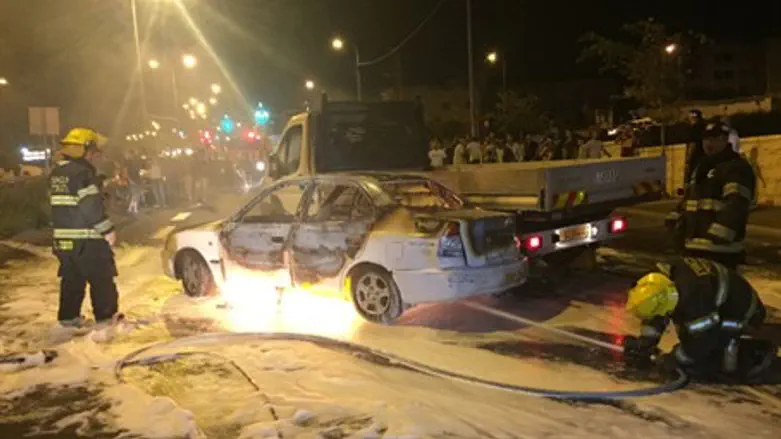
The Israel Security Agency (ISA) and Israel Police two weeks ago arrested the perpetrators of a string of firebomb attacks in and around Jerusalem in early August, it was cleared for publication on Sunday.
The attacks were carried out by a terror cell consisting of nine young Arabs from Beit Hanina in Jerusalem.
Four are believed to be directly involved in a firebomb attack on an Israeli vehicle near the capital's Ben-Zion interchange:
- Wasim Mohammed Salah Kostiro, born in 1996, threw a firebomb at the vehicle. He carries an Israeli resident card and was previously imprisoned for terror activity in Jerusalem.
- Mohammed Hussam Sayid Kirash, born in 1997, also carries an Israeli resident card and served as a lookout in the attack.
- Two other members, minors aged 16-17, also threw firebombs at the Israeli vehicle.
The cell members admitted to the ISA that they had planned the attack in advance, in "retaliation" for the murders of a Palestinian toddler and his father whose house was torched in Duma.
Hours after the Duma arson, the terror squad threw firebombs at "Beit HaShiva" in Beit Hanina, a compound inhabited by Jewish families.
Several days later, the cell conducted another attack, throwing firebombs a few meters off the road in Beit Hanina in order to burn a car filled with Jews. One vehicle was struck, and its owners, Uri and Inbar Azrak, were wounded.
Inbar suffered first and second-degree burns on 15% of her body and was taken to Hadassah Ein Kerem hospital for treatment.
Evidence against those implicated in the case was transferred to the Jerusalem District Attorney's Office and the nine were indicted on Sunday. The four terrorists who threw the firebomb directly at the Azrak's car have been charged with attempted murder.
"The actions of the members of the cell and their outcomes illustrate once again and even more strongly the high threat level of terror attacks in Jerusalem, posed, in particular, by the actions of those formerly jailed for similar activities," the ISA stated.